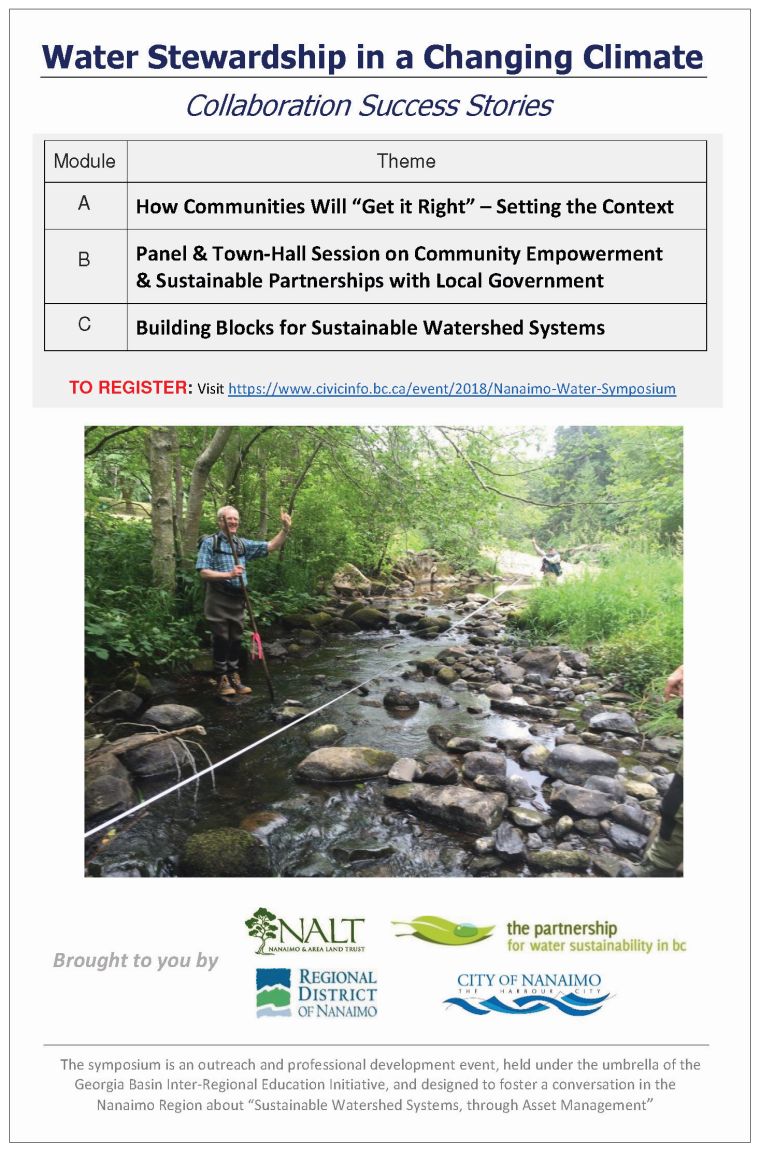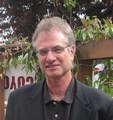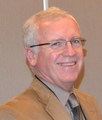A Symposium on Water Stewardship in a Changing Climate (April 11-12, 2018): “The Organizing Committee structured the Nanaimo Water Symposium as three modules to provide the audience with a mind-map,” stated John Finnie, Chair
 Cascading Modules
Cascading Modules
“The program for the Nanaimo Water Symposium is structured as three modules that are cascading in terms of the content that will enable the audience to have an informed conversation,” states John Finnie, Chair of the Organizing Committee.
 “Context is everything. Hence, two co-keynote presentations in Module A will set the context and prime participants for a town-hall sharing and learning session in Module B about restorative development. In the afternoon, a set of four reflective presentations will introduce building blocks for achieving Sustainable Watershed Systems.”
“Context is everything. Hence, two co-keynote presentations in Module A will set the context and prime participants for a town-hall sharing and learning session in Module B about restorative development. In the afternoon, a set of four reflective presentations will introduce building blocks for achieving Sustainable Watershed Systems.”
TO LEARN MORE:
Download a copy of the latest version of the PROGRAM BROCHURE
To register, visit https://www.civicinfo.bc.ca/event/2018/Nanaimo-Water-Symposium
MODULE A: How Communities Will “Get it Right” – Setting the Context
 BC has arrived at a fork in the road. Consider the weather extremes experienced in 2015, 2016 and 2017. Impacts are magnified by human interventions. In his co-keynote presentation, Kim Stephens (Executive Director of the Partnership for Water Sustainability) will explain the call to action for Sustainable Watershed Systems, through Asset Management.
BC has arrived at a fork in the road. Consider the weather extremes experienced in 2015, 2016 and 2017. Impacts are magnified by human interventions. In his co-keynote presentation, Kim Stephens (Executive Director of the Partnership for Water Sustainability) will explain the call to action for Sustainable Watershed Systems, through Asset Management.
He will ask the audience to reflect on this question: How will communities ‘get it right’ through collaboration as land develops and redevelops?
 In her co-keynote presentation, Zo Ann Morten (Executive Director of the Pacific Streamkeepers Federation) will reflect on the role stewardship groups have played since the early 1990s, as advocates for stream-protection, collaborating with decision-makers and providing important on-the-stream observations and actions.
In her co-keynote presentation, Zo Ann Morten (Executive Director of the Pacific Streamkeepers Federation) will reflect on the role stewardship groups have played since the early 1990s, as advocates for stream-protection, collaborating with decision-makers and providing important on-the-stream observations and actions.
“Community members caring for waterways are the key to making a difference in restoring naturally functioning watersheds over time,” says Zo Ann Morten.
MODULE B: Panel & Town-Hall Session on Community Empowerment & Sustainable Partnerships with Local Government
“The panel and town-hall segment is the program heart for the Nanaimo Water Symposium,” states Peter Law, panel lead. “Panel reflections on project experience will set the scene for town-hall interaction. The over-arching theme is: collaboration is necessary for restorative development; and  a ‘design with nature’ land and water ethic is key to ‘getting it right’ over time.”
a ‘design with nature’ land and water ethic is key to ‘getting it right’ over time.”
“Success stories resulting from local government and stewardship sector collaboration will be showcased. To inspire tangible and lasting action after the symposium, panel members will paint a picture of what collaboration must look like in practice to truly achieve the vision for restorative development.”
MODULE C: Building Blocks for Sustainable Watershed Systems
Julie Pisani will lead-off and elaborate on initiatives in the Regional District of Nanaimo under the umbrella of the Drinking Water & Watershed Protection Program. These include outreach and education, local water studies and community-based monitoring, and policy advocacy and support for land use planning.
Then Tim Pringle will share demonstration application anecdotes about the Ecological Accounting Process (EAP), a whole-system view of watersheds that assesses hydrology in order to accurately describe ecological services.
Christine Mettler will follow and report on research conducted with dozens of urban watershed practitioners across B.C., outlining environmental and management challenges and how new tools developed under B.C.’s new Water Sustainability Act could help to address some of these challenges.
Bob Sandford will provide a closing summary. He will connect the dots between his call to action the previous evening at the public lecture, and what he heard throughout the day of the symposium. His emphasis will be on identifying action items that are tangible and possible, and would lead to restorative development in the mid-Vancouver Island region and beyond.


